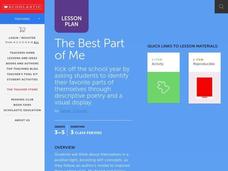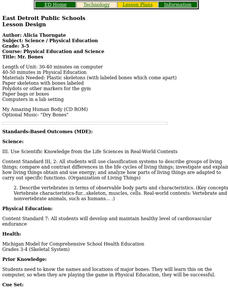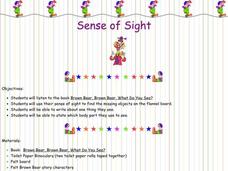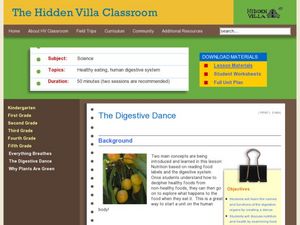Curated OER
Whose Parts Do I Have? (Wings and Things)
Students identify an animal and a body part and then matches a body part to a specific animal. This will assess their ability to sort organisms and objects into groups according to their parts and describe how the groups are formed and...
Curated OER
Fun Bones
Use the hokey pokey music to teach the names of some of the major bones in the human body. Circle up, put on the music, and put your right radius in. Use this in an anatomy class to spice things up a bit!
Curated OER
Where Does the Blood Go?
Students investigate where the blood in our hearts travels by observing a diagram in class. In this cardiovascular lesson, students examine their own heart by checking their pulse in class. Students investigate a human body...
Curated OER
Organ System Interactions
Eighth graders who have studied all of the organ systems now discover how they all are related and work together in the human body. They discuss a variety of situations in which more than one system plays a part. They identify the...
Curated OER
How to Make a Model of the Human Respiratory System
Students label parts of the human respiratory system on a diagram. They explain the function of diaphragm.
Curated OER
Organ Systems
Students state the name of major body systems, They identify what each system does and list the major organs in each system. In addition, they complete a puzzle matching organ systems to organ function.
Curated OER
Best Part of Me
Students determine a positive physical feature of themselves. They participate in an online writer's workshop and write descriptive poem about their favorite feature. They create a display of poetry and pictures.
Curated OER
Lub Dub
Learners name the vessels and parts of the heart. They trace the path of blood through the heart. Students examine the function of the circulatory system. They recognize the differences between a hear when the body is at rest opposed to...
Curated OER
It May Be Yucky, But Someone Has To Teach It. . .
Fourth graders study the names and parts of the excretory system in this hands-on activity. They use common items to make a model of the system.
Curated OER
Feed Me, Seymour
Students work in small groups to create posters illustrating the major facts and functions of plant organs. Within their groups, they assume the role of specialists creating specialized posters pertaining to the different parts of plants.
Curated OER
Human Skeletal System
Learners trace the outline of one of their members and draw in the bones from the diagram. They make flashcards of the bones out of index cards. Once the drawings and flashcards are finished, they quiz each other in preparation for a game.
Curated OER
Mr. Bones
Students play CD-ROM game My Amazing Human Body, and participate in relay game in Phys. Ed. where they put together skeleton on which body parts are labeled.
Curated OER
Review of the Five Senses
Students investigate the five senses. In this human biology activity, students are given five items and identify which items match best with each of the senses. Students use objects such as a rock, hard candy, and a flower.
Curated OER
Sense of Hearing
Students explore the sense of hearing. In this human biology lesson, students listen to the story Polar Bear, Polar Bear, What Do You Hear? and give examples of how they use their sense of hearing everyday. Students pass around plastic...
Curated OER
Sense of Sight
Students examine the sense of sight. In this human biology lesson, students read the book Brown Bear, Brown Bear, What Do You See? and discuss all of the animals seen in the story. Students use binoculars and take several digital photos...
Curated OER
Sense of Touch
Students identify their five senses by reading a story. In this human anatomy lesson, students read the book, Here Are My Hands by Bill Martin Jr, and touch a variety of objects. Students describe and record each object they...
Healthy Native Youth
Chapter 2: Learning About Adolescence
The Native American symbol, The Circle of Life, represents life's spiritual, physical, mental, and emotional well being. By way of deep discussion, and two games, the lesson uses the Circle of Life to explore the stages of...
University of Arizona
The Leg Bone Is Connected to The...
Students discover the names of 13 major bones in the human skeletal system. They construct their skeleton using paper plates and other simple products. Links to templates are provided within the resource.
Curated OER
Fulcrums in Our Body
Second graders discuss fulcrums and levers and identify at least two fulcrums and levers on their bodies. They also identify fulcrums and levers on animal bodies.
Curated OER
How Do Foods Help Our Bodies
Students investigate the specific elements found in food that keep us healthy. For this healthy eating lesson, students identify proteins, carbohydrates, minerals, and vitamins as part of a healthy diet when consumed in moderation....
Curated OER
The Digestive Dance
Students read food labels to compare healthy verses non healthy food and then use diagrams to create a poster of the digestive system. In this food lesson plan, students move the food down the digestive track along the digestive system.
Curated OER
Can You Name Parts of the Body?
Students share what they know about the human heart. In this early anatomy lesson, students discuss the location, shape, and importance of the human heart.
Curated OER
Excretory System
Learners discuss what happens to the trash in their home. They talk about what would happen if they didn't remove the trash. Students relate their home trash to the excretory system of their bodies. They label a diagram of the urinary...
Curated OER
Digestive System
Students explore the parts of the digestive system. Using interactive spreadsheet software, students observe, name and describe the function of each part of the digestive system. Students may work individually or in pairs.























